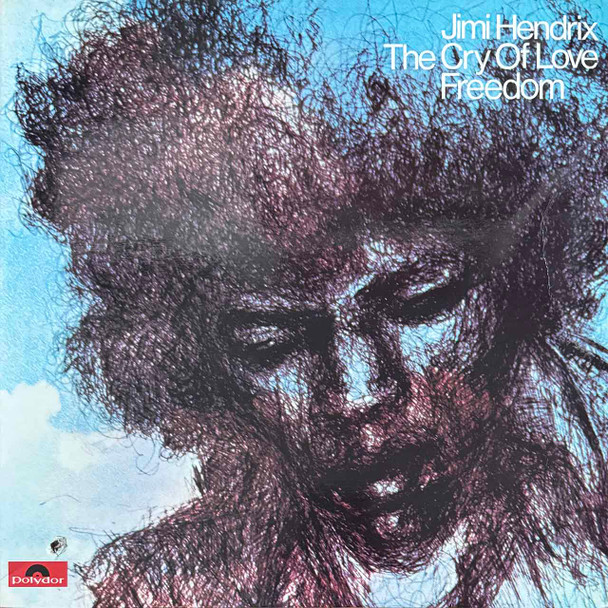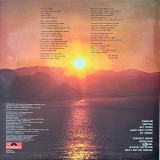Album Info
| Artist: | Jimi Hendrix |
| Album: | The Cry Of Love |
| Released: | Australia, 1980 |
Tracklist:
| A1 | Freedom | 3:24 |
| A2 | Drifting | 3:46 |
| A3 | Ezy Ryder | 4:09 |
| A4 | Night Bird Flying | 3:50 |
| A5 | My Friend | 4:40 |
| B1 | Straight Ahead | 4:42 |
| B2 | Astro Man | 3:37 |
| B3 | Angel | 4:25 |
| B4 | In From The Storm | 3:42 |
| B5 | Belly Button Window | 3:34 |
Info About Buying Vinyl From Our Record Store
- We are a small independent record store located at 91 Plenty Rd, Preston in Melbourne's North (Australia)
- We buy and sell new and used vinyl records - if you have a collection you'd like to sell please click here.
- All pictures of the second hand/used vinyl records are actual pictures of the album in stock.
- We ship Australia wide for a flat rate of $10 for standard shipping or $15 for express post.
- Free Shipping for orders $150 and over.
- You can also pick up your order in store, just select Local Pickup at the checkout.
- We also ship internationally - prices vary depending on weight and location.
- We ship vinyls in thick, rigid cardboard mailers with a crushable zone on either side, and for extra safety we bubble wrap the records.
- We almost always ship in stock vinyl next business day (excluding pre orders)
- We are strongly committed to customer satisfaction. If you experience any problems with your order contact us so we can rectify the situation. If the record arrives damaged or doesn't arrive we will cover the cost of replacing or returning the record.
- If you change your mind you have 30 days to return your record but you must cover the cost of returning it to the store.
- You can contact our Melbourne record shop at (03) 9939 3807 or at info@funkyduckvinyl.com
- Happy Listening!
Description
Jimi Hendrix's "The Cry of Love" is a posthumous album that was released on March 5, 1971. This album holds a special place in the hearts of Hendrix fans as it was the first album released after his untimely death in September 1970. It features a collection of tracks that were recorded during the last years of his life, showcasing his incredible talent and innovative approach to music.
The album is often celebrated for its blend of rock, blues, and psychedelic sounds, which were hallmarks of Hendrix's style. It includes standout tracks like "Freedom," which is an anthem of liberation and self-expression, and "Angel," a poignant ballad that reflects Hendrix's introspective side. "The Cry of Love" also features the energetic "Ezy Ryder" and the soulful "Night Bird Flying," both of which highlight his exceptional guitar work and unique vocal delivery.
Critically, the album received a warm reception upon its release. Major publications like Rolling Stone praised it for its emotional depth and musicality. The album was seen as a fitting tribute to Hendrix's legacy, capturing the essence of his artistry. It was also nominated for a Grammy Award for Best Rock Vocal Performance, which speaks to its impact and the high regard in which it was held by the music community.
One of the interesting aspects of "The Cry of Love" is its production. The album was produced by Eddie Kramer, who had worked closely with Hendrix throughout his career. Kramer’s expertise in capturing Hendrix's sound is evident in the album's production quality, which allows the listener to fully appreciate the nuances of Hendrix's guitar work and the richness of the arrangements. The album features a mix of studio recordings and live performances, giving it a dynamic feel that keeps listeners engaged.
Hendrix's bandmates and collaborators, including Billy Cox and Mitch Mitchell, contributed to the album, adding layers of rhythm and texture that complement Hendrix's guitar. The chemistry between the musicians is palpable, and it’s clear that they were all deeply influenced by Hendrix's vision. In interviews, Cox has mentioned how Hendrix was always pushing the boundaries of music, and this album is a testament to that relentless creativity.
The cultural significance of "The Cry of Love" cannot be overstated. Released during a time of great social upheaval in the United States, the album's themes of freedom and self-discovery resonated with many listeners. Hendrix's music often served as a voice for the counterculture movement of the 1960s and early 1970s, and this album continued that legacy. Tracks like "Freedom" became anthems for those seeking change and empowerment.
In terms of personal anecdotes, there are many stories about the making of the album. For instance, it is said that Hendrix was deeply involved in the creative process, often experimenting with different sounds and techniques in the studio. His innovative spirit is evident in the way he blends genres and pushes musical boundaries throughout the album.
Overall, "The Cry of Love" stands as a powerful reminder of Jimi Hendrix's genius. It captures the essence of his artistry and serves as a bridge between his earlier work and the legacy he left behind. The album is not just a collection of songs; it is a heartfelt expression of a brilliant artist who was taken too soon. For anyone looking to explore Hendrix's music, "The Cry of Love" is an essential listen that showcases his unparalleled talent and enduring influence on rock music.





